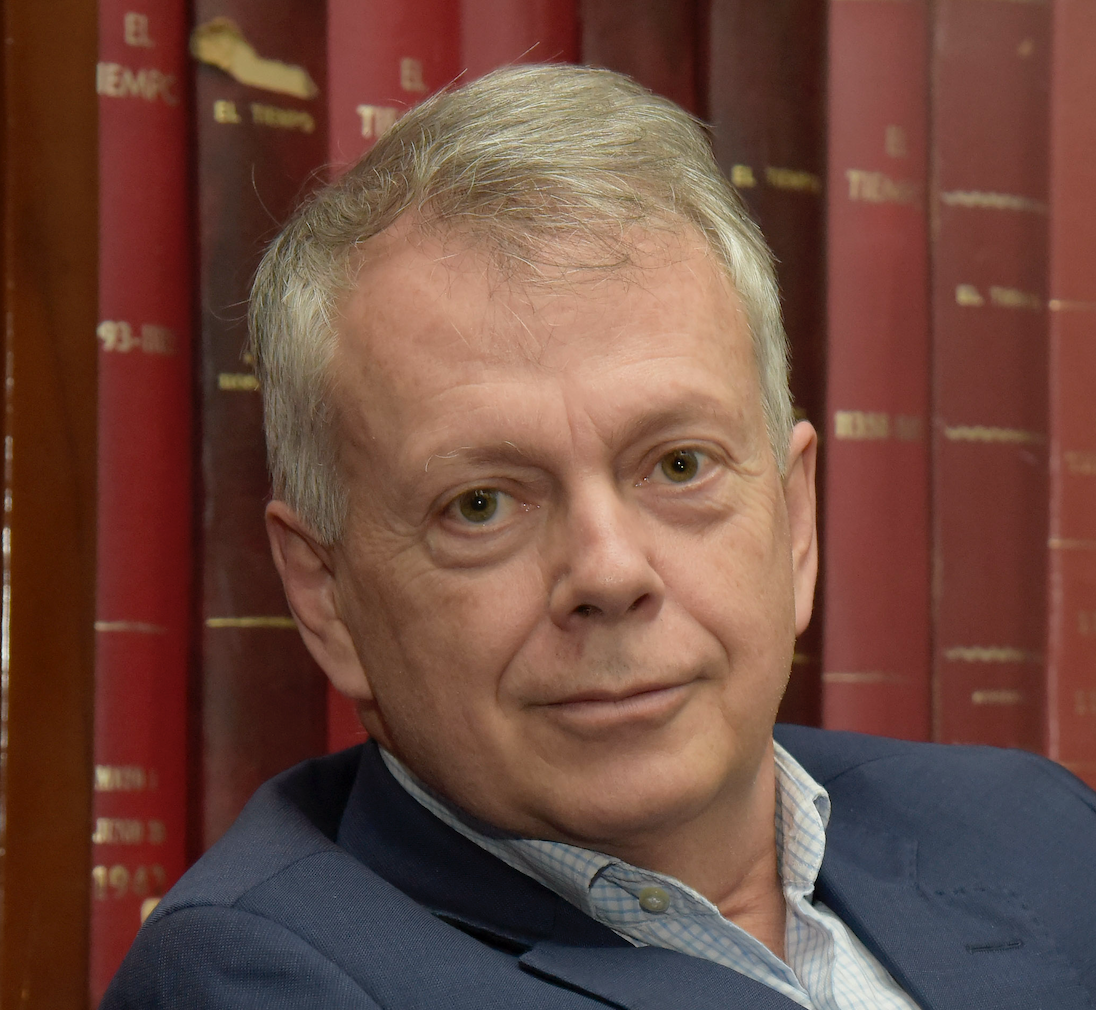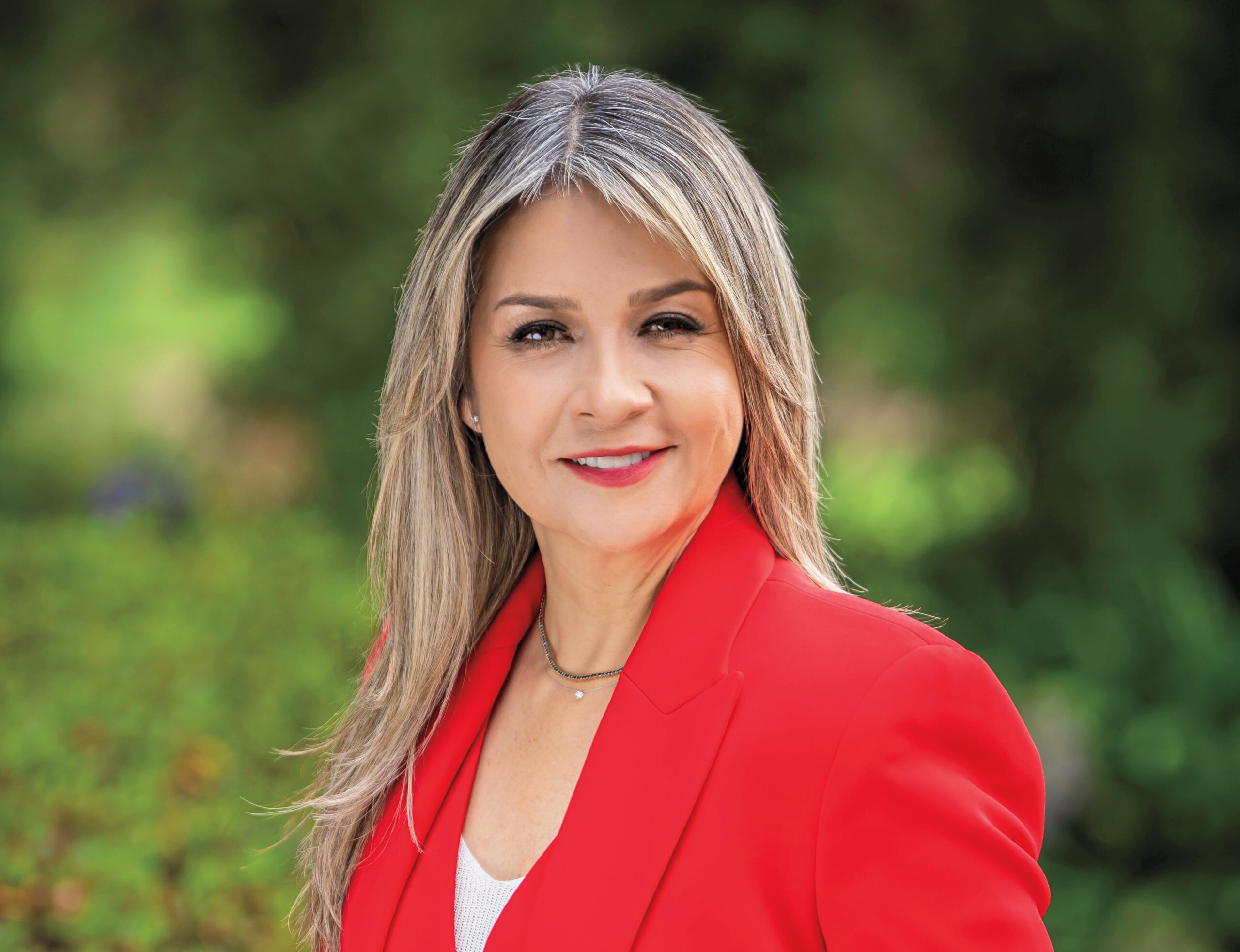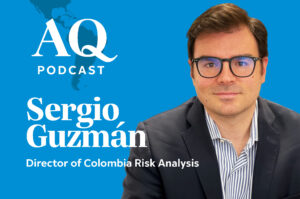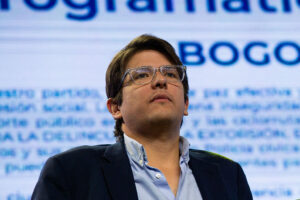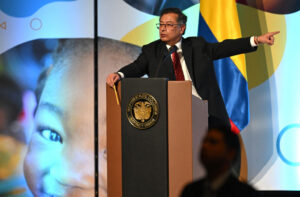This article is adapted from AQ’s special report on COP30
BOGOTÁ—On the campaign trail at the end of May, Vicky Dávila received another reminder of why she is running for president in Colombia’s 2026 election.
A former TV and print journalist with a career spanning 33 years, Dávila was in Barranquilla, one of the country’s most vibrant yet unequal cities. She spoke with an elderly man selling carrots at a local market and was transported to the essential reality beyond the major stories she once covered.
“He told me that life was hard,” Dávila recalled. After a brief conversation, she started to walk away, and the vendor began to cry softly. Dávila turned back and asked why he was crying. “He said that there was no hope for people like him, that he felt helpless. That moment reminded me why I’m doing what I’m doing.” Dávila relived the encounter hours later when I interviewed her for this story in Bogotá, as the 52-year-old discussed her career and her journey to run as an independent in a highly polarized nation.
In June, the assassination attempt on right-wing candidate Senator Miguel Uribe Turbay at a campaign rally in this city raised fears of a return to the political violence the country experienced in the 1980s and 1990s. The 39-year-old politician is still in critical condition at a clinic in Bogotá, while threats on other people have increased. On June 12th, the head of the National Police visited Dávila at her apartment and shared an intelligence report about a credible menace from a criminal organization.
Before entering the long list of hopefuls for next year’s general election, Victoria Eugenia Dávila—her full legal name—resigned from her position as editor-in-chief of the magazine Semana last November, with aspirations to lead the country on a conservative platform. Colombia is the world’s largest cocaine producer, and continues to face the lingering effects of a prolonged guerrilla conflict. Furthermore, the social landscape is complicated by high inequality, with significant income and opportunity disparities persisting between urban and rural areas and across racial and ethnic lines.
Initially viewed as a long shot due to her lack of political experience, Dávila’s name has consistently ranked among the top three in opinion polls since last September. This resilience suggests she could be the dark horse in the race to govern this country of 52 million people, Latin America’s third largest.
With more than 60 presidential hopefuls in the race and Dávila leading many of them in the polls, some believe she should be taken seriously in a contest whose first round is scheduled for May 31, 2026. Her goal is to succeed President Gustavo Petro, a former member of the M-19 guerrilla movement and the nation’s first leftist president, who has become more radical as the end of his term approaches next August. In June Petro’s approval rating dropped to 29%, while his disapproval rose to 64%, according to Invamer, a polling firm.
Rise to fame
Dávila comes from a humble background, has been a media figure for decades, and “has a special connection to people,” said Bogotá-based political analyst Leonardo García. Throughout her career, she has “exposed corrupt practices and criticized politicians and powerful people, and all that makes her the perfect outsider,” García told AQ.
Helping her chances is Dávila’s public recognition. A report on candidates or potential hopefuls in the 2026 contest published by Guarumo, EcoAnalítica, and Wise in late April showed Dávila with the most followers on X (4.1 million), Instagram (1.3 million), and TikTok (611,100), and the second-most followers on Facebook (938,887), behind Claudia López, the former Bogotá mayor.
According to her recently published autobiography, The Cost of Telling the Truth, Dávila experienced extreme poverty during most of her youth. The daughter of an adolescent mother and an abusive father, she was born in the agricultural city of Tuluá, in the Cauca Valley, but considers herself from Buga, a midsize city about 43 miles north of Cali.
She witnessed episodes of severe domestic violence on numerous occasions, and her mother decided to escape with her children when Dávila was 12 years old. Despite the incidents at home, she excelled in her studies and displayed a natural talent for music. She was nine the first time she performed in front of a large audience, and she recalled that singing cured her of any stage fright.
Years later, she decided on journalism as a career. In the early days of her studies at a university in Cali, a classmate mentioned a casting call for a program on the regional TV channel, Telepacífico. Dávila was chosen—but received no salary—so she taught religion at a local high school to supplement her income. She later reported on security at NotiPacífico, where the pace was intense due to the fight against illegal drugs and the infamous Cali cartel. TV-Hoy, a national newscast, took notice of the 21-year-old journalist and offered her a position in Bogotá.
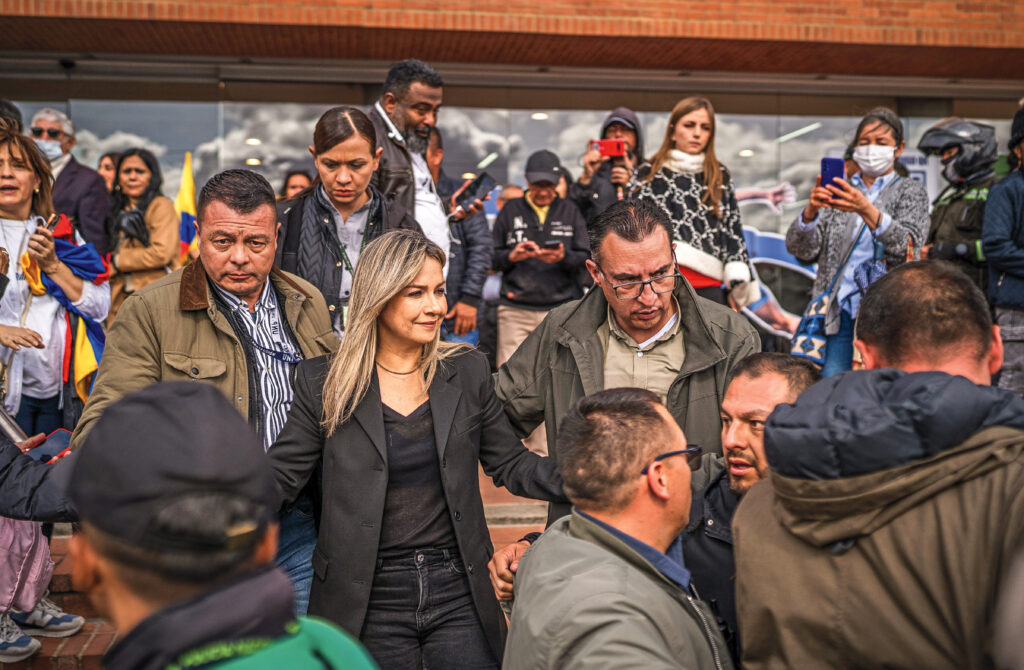
Photo by Diego Cuevas/Getty.
The big leap
In less than a year, Dávila joined the news program QAP, which aired from 1992 to 1997. “She was considered a junior in a room full of seasoned journalists,” remembered former colleague Leyla Ponce. The independent newscast, led by journalists María Isabel Rueda and María Elvira Samper, had Nobel Prize-winner Gabriel García Márquez as one prominent contributor. “But after a few months, Vicky demonstrated that she would get to the most difficult sources no matter what. If she had to go through a wall, she would do it.”
Dávila next worked for RCN, a private media conglomerate where she would stay for 18 years, becoming a familiar face in Colombia. She hosted a radio show in the mornings and presented the evening news from Monday to Friday. Her sharp instincts as a reporter enabled her to become a ferocious interviewer and interact effectively with the political elite.
All of this came to a sudden stop in 2016, when RCN surprisingly rescinded Davila’s contract, first from TV and later from radio. A short press release explained her departure as a resignation. It is believed that a report exposing police corruption, combined with her criticism of the peace process and of alleged excessive expenditures at the presidential palace, distanced her from President Juan Manuel Santos and his administration. Dávila writes in her autobiography that she was convinced the pressure exerted by the Santos government against the Ardila family, RCN’s owners, was behind the decision.
Rebranding
Being a free agent was challenging, even for someone recognized as a media star. In July 2016, the former anchor reinvented herself by launching Vicky Dávila Digital. The new site attracted 50,000 subscribers on its first day online, a number that grew to 300,000 just a few weeks later, according to her figures.
She returned to established media in early January 2017 at W Radio. Almost three years later, Gabriel Gilinsky, the new owner of Semana, Colombia’s best-known magazine, hired Dávila as head of digital news. From the beginning, she faced strong resistance within the print edition’s staff, who felt Dávila had more resources and support from the owner. In late 2020, tensions reached a new high when a mass resignation took place. The situation could be summarized as “it’s us or her.”
Gilinsky chose Dávila, who became the editor-in-chief of the weekly. The editorial line moved toward the right, aligning more closely with the Iván Duque administration. Revelations, such as the irregular financing from Brazilian construction giant Odebrecht for the 2014 presidential campaigns of Santos and Óscar Iván Zuluaga, were published.
During the 2022 presidential election, Dávila regularly interviewed then-candidate Gustavo Petro, who won the second round by a slim margin. Relations soured after internal recordings of Petro’s campaign were leaked.
A turning point came in February 2023, when Semana ran an interview with Day Vásquez, who had been married to the president’s son Nicolás, claiming that he received illegal campaign contributions. The legal case is proceeding slowly. Nicolás, who initially agreed to cooperate with the prosecutor’s office, now claims he is innocent. President Petro has denied any wrongdoing.
These revelations took place around the same time as the Gilinsky family was trying to complete a hostile takeover of one of Colombia’s largest conglomerates, Grupo Empresarial Antioqueño (GEA). Eventually, Jaime Gilinsky (Gabriel Gilinsky’s father) became the main shareholder and CEO of Nutresa, a processed foods multinational that was formerly part of GEA.
For some, Semana was far from objective in its coverage of the deal, and the publication lashed out at critics. When asked what happened, Dávila told AQ, “Gabriel is no longer my boss. He allowed me to do my job freely, and for that, I thank and respect him, but now things are different.”
Dávila’s platform
The now-presidential candidate spends her days traveling the country, talking to students, street vendors, housewives, taxi drivers and anyone else who will listen. Dávila says that now she is seeing another side of Colombia, starting with the poverty and desperation of many citizens. The country’s 2023 poverty rate was 32.4%, above the Latin American average of 25%. “I understand the pain because I come from there,” she said.
She has vowed to crack down on crime, and her platform is based on respect for institutions such as the armed forces and the police. Petro’s total peace policy of negotiating agreements with dozens of armed groups is widely considered a failure, and the military has taken a harder line stance recently.
Fighting corruption is also at the top of her list. “The money to help the poorest of my compatriots is there, but it is being stolen by people whose names we know and who still have the power,” added Dávila. Colombia’s traditional parties, as well as former President Santos, Petro, and the Pacto Histórico, which supports the current president, are continuous objects of her criticism.
When asked how she would govern, Dávila signaled that authority and transparency would be her trademarks. She favors a smaller government, which includes cutting bureaucratic processes and reducing red tape. Dávila proposes a 10-10-10 rule for taxes: a personal income tax rate, a corporate tax rate, and a sales tax. She also insisted that she would hire the best talent. “I know what I don’t know, and I’ll assemble a great team.”
Playing the role of an anti-establishment politician and challenging outdated practices could draw in voters. In 2022, former Bucaramanga Mayor Rodolfo Hernández nearly won the presidential election, despite his age and several controversies. Hernández “represented a break from the past for many people, something different,” said García, the political analyst. “There is no doubt that, when compared to him, Vicky looks like a stronger candidate,” he added.
Like many on the Latin American right, Dávila celebrates Javier Milei’s accomplishments in Argentina and plans to follow his policy of slashing the budget to balance public finances. Regarding Donald Trump, she has been more cautious but applauded the decision to cancel USAID contracts. “American taxpayers don’t have to be financing projects of the harmful and destructive left in Colombia,” she posted on X in early March.
Political future
Key to Dávila’s future is whether former President Álvaro Uribe endorses her as the standard-bearer of the right wing, despite resistance within his Centro Democrático party. Alicia Arango, Uribe’s private secretary for two terms, joined Dávila’s campaign in early April, a move seen as a subtle message of support. In response, Uribe stated, “I am very loyal to the party.”
This suggests that an eventual endorsement may occur later in the race, after the party has chosen a candidate. If that person fares poorly in the polls, loses to Dávila in a right-wing primary, or is defeated in the first round of the election, things might change. For now, Dávila is running as an independent.
While going solo and proving that she is not the typical politician may bolster Dávila’s candidacy, some journalists have reservations. Juanita León, editor-in-chief of La Silla Vacía, the leading independent digital media outlet in Colombia, characterized Dávila as “hardworking and charismatic,” a person who “could embody the feeling of rejection toward Petro and the political class.” Nonetheless, León warned that “the role she played while at Semana, using the magazine in order to advance the interests of its owner (Gilinsky) in the hostile takeover of Nutresa, opens a question mark about her ethical integrity.”
Others spoke of her human qualities, beginning with family values. “She made peace with her father before he died, and since she was almost a child, she took care of her brothers and mother, whom she adores,” said her former colleague Ponce. “She is what she says she is, and her life story is her biggest asset,” a former boss told AQ.
The real race will begin after the legislative elections next March. At that point, Colombian voters will refine their opinions and assess the strengths and weaknesses of what is currently a large pool of candidates. If Dávila wins, she would be the first female president in Colombia’s history. Others, such as former Foreign Minister Noemí Sanín, have tried. In 2018, Marta Lucía Ramírez was elected as Duque’s vice president, while Francia Márquez serves as Petro’s number two.
Predicting whether Dávila will stay in until the end is impossible, but she has a quick answer thus far. “I entered this race to win,” she said. “And remember, my first name is Victoria.”


